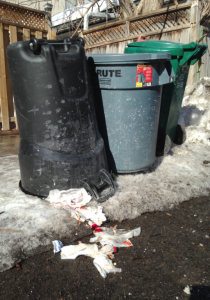Most garbage-related complaints last year came from the Rideau-Vanier ward and residents still face major problems because of trash.
The city received 581 service request calls from this ward alone in 2013, two of which came from Zach Gruber, who says curbside garbage collection in Ottawa leaves a lot to be desired.
“Last Thanksgiving, no one picked up my trash,” he says.
Gruber called the city’s service hotline to report the problem and the operator gave him two options: to wait two weeks until the next pick-up or to bring it directly to a landfill. He chose to wait.
“So it just stayed there for three weeks. Cats tipped over the garbage can and tore through my bags to get turkey bones,” he says. “They left quite a mess.”
Gruber says that two weeks can be a long time to wait between pick-ups, especially when collectors leave some bags behind.
The area’s councillor, Mathieu Fleury, notes that his ward calls most frequently across the board for many other reasons besides garbage, such as graffiti, parking and property standards.

“People need to keep reporting these issues,” he insists. “I want to work closely to improve the quality of life in our community for both visitors and residents.”
Rideau-Vanier also gets a lot more visitors, Fleury says, which might factor in the high number of garbage complaints.
Most of the 8,753 garbage service calls recorded in 2013 are from missed pick-ups, according to a 311 operator in Ottawa. Other calls include complaints about how trash “looks bad, smells bad or attracts pests,” she says.
Requests to obtain city-subsidized garbage, recycling and compost bins as well as waste collection calendars are categorized separately. These requests alone account for 24,550 calls.
When counting all waste-related service calls—including recycling, organics, yard waste and Christmas tree pick-ups—the number rises to 56,060, which represents more than 29 per cent of Ottawa’s 311 calls recorded in 2013.
Every time someone calls the service hotline, their request or complaint is documented by type and by ward. The compiled information is made accessible the following year on Ottawa’s open data website, which currently includes years 2010 to 2013.
Kelsey Johnson used to live in the Capital ward, which registered 434 trash-related calls. Garbage at her former Old Ottawa South residence also attracted wildlife—a massive, vicious raccoon, she says.

“Once he started tearing apart all the bags and making a mess, it didn’t look very nice, it smelled and it was attracting wasps,” Johnson says.
She is not surprised to see the Capital ward listed among the top five with the most 311 calls about garbage. The recent Carleton University graduate describes her former neighbourhood as a “student ghetto.”
Just like in the other four wards, there are more rental properties with students and lower-income individuals. Johnson suspects tenants might care less about the property’s appearance than if they owned it.
“You have a lot of students who are either too lazy to check the schedule and you also might have a few more parties, so you’re creating more waste,” she says.

The city’s waste management could better plan biweekly collection, Johnson says, especially at peak times like Labour Day weekend.
“They always seem to pick up plastic on big moving weekends when everybody’s got cardboard,” she says.
Johnson also thinks pest problems could be avoided if people bagged their trash properly and took it out only when necessary. The collection schedule can even be downloaded on a smartphone, she adds.
“It’s not rocket science.”
Kelsey Johnson recounts her encounter with a raccoon that visited the garbage cans at her former Old Ottawa South residence. Video by Philippe de Montigny.

